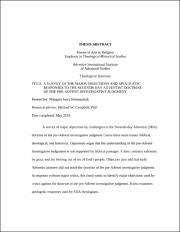A Survey of the major objections and apologetic responses to the Seventh-day Adventist doctrine of the pre-advent investigative judgment
Abstract
A survey of major objections by challengers to the Seventh-day Adventist (SDA) doctrine of the pre-Advent investigative judgment covers three main issues: biblical, theological, and historical. Opponents argue that the understanding of the pre-Advent Investigative Judgement is not supported by biblical passages. It then contrasts salvation by grace and the blotting out of sin of God’s people. Objectors also add that early Adventist pioneers did not teach the doctrine of the pre-Advent investigative judgment. In response to those major critics, this thesis seeks to identify major objections used by critics against the doctrine of the pre-Advent investigative judgment. It also examines apologetic responses used by SDA theologians.
The SDA Church asserts that the description of the pre-Advent investigative judgment is found throughout the Bible. The understanding of God’s investigative judgment before granting either His reward or punishment is implicitly depicted in the Bible. The purpose of the judgment is to vindicate God’s character and to affirm the salvation of true believers in front of the heavenly angels. Daniel 7:25 implies that the primary focus of the judgment is the true believers rather than the little horn.
Justification by faith is an important concept that gives believers assurance that they can confidently face God’s final judgment. Judgment according to works will guard the believers to live by God’s law. SDAs differentiate between the forgiveness of sin versus the blotting out of sin. This distinction can be seen between the typical daily ministry versus the yearly ministry in the earthly sanctuary, which is the typical cleansing of the sanctuary on the Day of Atonement. The early Sabbatarian Adventists addressed the teaching of the pre-Advent investigative judgment extensively in their writings.
Collections
Related items
Showing items related by title, author, creator and subject.
-
The Principle of articulation in Adventist theology : an evaluation of current interpretations and proposal
Graf, Roy (Adventist International Institute of Advanced Studies, 2017-04)The principle of articulation is a basic type of presupposition of human reason that allows the systematization of knowledge in general and of theological knowledge in particular. It is the structuring element in any ... -
Church growth theory and the development of the Seventh-day Adventist church mission in Georgia : a case study
Namoradze, Sergo (Adventist International Institute of Advanced Studies, 2018-01)The Seventh-day Adventist (Adventist) Church growth rate in the country of Georgia is remarkably low. It has only 368 members despite its long history in Georgia. Using a qualitative case study research design, this study ... -
Righteousness by faith and the lifestyle beliefs of the Seventh-day Adventist Church : suggested instructional guide for the North Philippine Union Mission
Perdon, Benny Barizo (Adventist International Institute of Advanced Studies, 2002-09)This project focuses on a guide of instruction for the lay leaders in the NPUM to rightly present the fundamental beliefs of SDAs in the context of righteousness by faith. This study shows that although the church members ...


